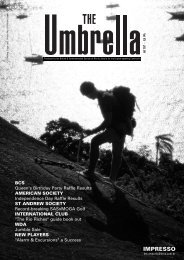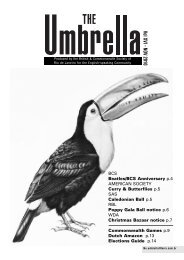IMPRESSO - Rio Societies
IMPRESSO - Rio Societies
IMPRESSO - Rio Societies
You also want an ePaper? Increase the reach of your titles
YUMPU automatically turns print PDFs into web optimized ePapers that Google loves.
DON’T PIGEON-HOLE<br />
CHARLES DARWIN<br />
By Nick Spencer<br />
A week after he died, Charles Darwin<br />
was buried in Westminster Abbey. He<br />
hadn’t asked for the honour but<br />
eminent friends felt that the nation<br />
could not leave its finest scientist<br />
since Newton in an obscure, rural<br />
churchyard.<br />
Christian opinion seemed to agree.<br />
“A great man has gone from amongst<br />
us,” commented the South American<br />
Missionary Society. Darwin was “of<br />
most unblemished character, of the<br />
highest intellectual power... a sincere<br />
and persevering searcher into truth.”<br />
Dar win’s relationship with<br />
missionar y work gives some<br />
indication of why he was accorded a<br />
Westminster grave and why we should<br />
be careful not to pass quick<br />
judgement on him. He came from<br />
sceptical stock. His family had eagerly<br />
supported the ‘Saints’ in their<br />
campaign against slavery but had<br />
shared little of their evangelical<br />
fervour. Darwin himself trained for<br />
the Anglican ministry but largely<br />
because his father, worried he was<br />
turning into “an idle, sporting man”,<br />
forced him to.<br />
To his credit Darwin asked for time<br />
to consider, and read through some<br />
heavy theological tomes to assess his<br />
own “orthodoxy”. Duly convinced he<br />
entered Cambridge in 1828. There is<br />
no reason to doubt the reality of that<br />
“orthodoxy” but it is important to<br />
note what kind of orthodoxy it was.<br />
Darwin was powerfully influenced by<br />
the rational, natural theology of<br />
W illiam Paley. Accordingly,<br />
“orthodox” meant being able to<br />
assent to basic Christian doctrines. It<br />
was assured and demonstrable.<br />
Darwin’s Christianity was true<br />
primarily because the natural world<br />
pointed to structure, harmony and<br />
happiness.<br />
This was the Christianity he took on<br />
the Beagle in 1831 (instead of Holy<br />
Orders) and this was the Christianity<br />
that faded on his return in 1836,<br />
when he began to think methodically<br />
about what he had experienced.<br />
Earthquakes, volcanic eruptions,<br />
uncivilised “savages”, bizarre fossil<br />
remains, intriguing distribution of<br />
species — all suggested that the<br />
world was not ordered in the way that<br />
confident natural theologians<br />
imagined. When he read the Rev<br />
Thomas Malthus’ Essay on the<br />
Principle of Population in 1838, a<br />
vision of inevitable “misery and vice”<br />
replaced Paley’s “happy world... [of]<br />
delighted existence”, and Darwin’s<br />
former orthodoxy was all but gone.<br />
His Christianity did not altogether<br />
die in the 1830s but it showed few<br />
signs of life afterwards. The death of<br />
his favourite child, Annie, in 1851<br />
was the final nail in its coffin. Darwin<br />
had witnessed every moment of her<br />
painful, degrading sickness and after<br />
her death was no longer able to<br />
reconcile his experience of life with<br />
his understanding of the Christian<br />
God. In truth, it was the age-old<br />
problem of suffering rather than his<br />
new theory that did for his<br />
Christianity.<br />
Despite all this, Darwin remained a<br />
cultural Christian, in a serious,<br />
almost committed, way. This had its<br />
origins in his family’s association with<br />
abolitionist evangelicals (in The<br />
Descent of Man he implies that<br />
Thomas Clarkson was to morality<br />
what Newton was to science).<br />
Darwin’s first published article was a<br />
defence of missionary activity and<br />
although he avoided discussing<br />
Christianity in public, his few<br />
remarks on the subject in The Voyage<br />
of the Beagle were wholly positive.<br />
Darwin observed several missions in<br />
the South Pacific and commented on<br />
their positive impact on the manners,<br />
morals, education, and piety of<br />
Pacific Islanders. Any voyager<br />
unlucky enough to be ship-wrecked<br />
on some unknown coast should<br />
“most devoutly pray” that<br />
missionaries had got there first, he<br />
remarked.<br />
One of his friends from the Beagle<br />
days was 2nd lieutenant<br />
Bartholomew Sulivan. Sulivan was,<br />
and remained, a keen supporter of<br />
Christian mission, and he and<br />
Darwin corresponded on the subject<br />
for many years.<br />
Darwin was initially sceptical about<br />
the missionaries’ capacity to civilise<br />
the natives of Tierra del Fuego in the<br />
way they had the Pacific Islanders,<br />
but Sulivan’s reports impressed him<br />
and later in life he not only made<br />
regular small donations to the South<br />
American Missionary Society but<br />
even asked to become an honorary<br />
member. Nor was this simply an<br />
overseas commitment. After moving<br />
to Downe in 1842, Darwin lived a life<br />
Charles Darwin at 51<br />
uncannily similar to that of a liberal<br />
Anglican clergyman. He founded<br />
and served on numerous clubs for<br />
the needy of the parish, funded<br />
church repairs and regularly<br />
contributed financially to the village<br />
Sunday school.<br />
In 1880, a local evangelist, James<br />
Fegan, wrote to Darwin in this<br />
capacity requesting the use of a room<br />
in Downe village to bring his tent<br />
revival meetings indoors. Darwin not<br />
only granted permission but<br />
commented, “Your services have<br />
done more for the village in a few<br />
months than all our efforts for many<br />
years.”<br />
Darwin died an agnostic, adamant<br />
that he had never “even in his wildest<br />
fluctuations” been an atheist and that<br />
it was “absurd to doubt that a man<br />
may be an ardent Theist & an<br />
evolutionist”. He was an agnostic,<br />
however, who remained a genuine<br />
supporter of Christian missionary<br />
work, both at home and abroad.<br />
This was more than simply high<br />
Victorian moral seriousness (there<br />
were, after all, many scientificallyminded<br />
Victorians who disapproved<br />
of missionary work). In truth,<br />
Darwin’s combination of a lost faith<br />
and missionary support is rather like<br />
the paradox of an agnostic being<br />
buried in Westminster Abbey. It<br />
reminds us that Darwin was too<br />
complex and too subtle an individual<br />
to be either deified or demonised. As<br />
the historian John Hedley Brooke<br />
once observed, we should be careful<br />
not to pigeon-hole the man who<br />
wouldn’t pigeon-hole pigeons.<br />
[Reprinted from the Church of England<br />
Newspaper, submitted by Noreen<br />
Smith]<br />
Looking Back<br />
17






